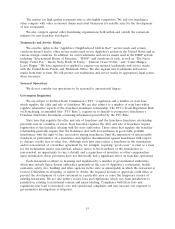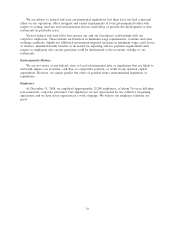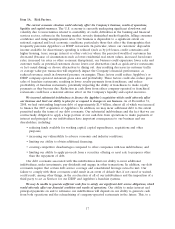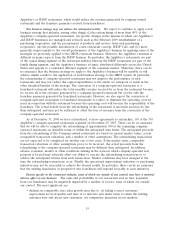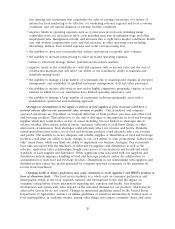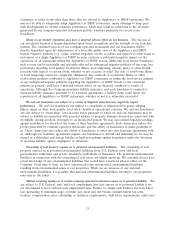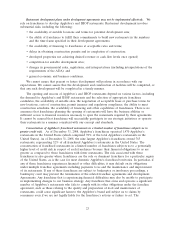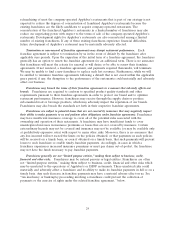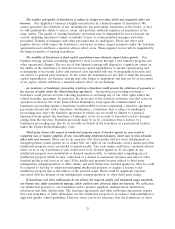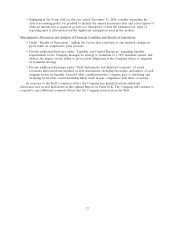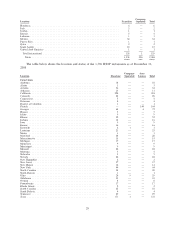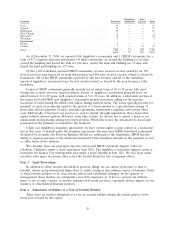IHOP 2008 Annual Report Download - page 36
Download and view the complete annual report
Please find page 36 of the 2008 IHOP annual report below. You can navigate through the pages in the report by either clicking on the pages listed below, or by using the keyword search tool below to find specific information within the annual report.and other employment-related matters may have a material adverse effect on our business or
operations. In addition, employee claims based on, among other things, discrimination, harassment or
wrongful termination may divert financial and management resources and adversely affect operations.
The losses that may be incurred as a result of any violation of such employment laws are difficult to
quantify.
Our failure or the failure of our franchisees to comply with federal, state and local governmental
regulations may subject us to losses and harm our brands. The restaurant industry is subject to extensive
Federal, state and local governmental regulations, including those relating to the preparation and sale
of food and alcoholic beverages and those relating to building and zoning requirements and
employment. We are also subject to licensing and regulation by state and local departments relating to
the service of alcoholic beverages, health, sanitation, fire and safety standards, and to laws governing
relationships with employees, including minimum wage requirements, overtime, working conditions and
citizenship requirements. We are also subject to laws and regulations, which vary from jurisdiction to
jurisdiction, relating to nutritional content and menu labeling. Compliance with these laws and
regulations may lead to increased costs and operational complexity and may increase our exposure to
governmental investigations or litigation. In connection with the continued operation or remodeling of
certain restaurants, we or our franchisees may be required to expend funds to meet Federal, state and
local and foreign regulations. The ability to obtain or maintain such licenses or publicity resulting from
actual or alleged violations of such laws could have an adverse effect on our results of operations. We
are subject to federal regulation and certain state laws which govern the offer and sale of franchises.
Many state franchise laws contain provisions that supersede the terms of franchise agreements,
including provisions concerning the termination or non-renewal of a franchise. Some state franchise
laws require that certain materials be registered before franchises can be offered or sold in that state.
The failure to obtain or retain licenses or approvals to sell franchises could adversely affect us and the
franchisees. Changes in, and the cost of compliance with, government regulations could have a material
effect on operations.
We are subject to the Fair Labor Standards Act, various other laws and state and local regulations
in the United States and in the foreign countries in which we operate from time to time, governing
such matters as minimum-wage requirements, overtime and other working conditions and citizenship
requirements. A significant number of the food-service employees in our restaurants are paid at rates
related to the United States federal minimum wage or the relevant state minimum wage, and past
increases in the United States federal and state minimum wage, as well as changes in the method of
calculating the minimum wage and crediting of tips, have increased labor costs, as would future
increases. Any increases in labor costs might cause us or our franchisees to inadequately staff
Applebee’s or IHOP restaurants. Understaffed restaurants could result in reduced gross sales and
decreased profits at such restaurants.
We and our franchisees must also comply with Title III of the Americans with Disabilities Act (the
‘‘ADA’’). Compliance with the ADA generally requires that public spaces provide reasonable
accommodation to disabled individuals and that new commercial spaces or modifications of commercial
spaces conform to specific accessibility guidelines unless materially unfeasible. Although newer
restaurants are designed to meet the ADA construction standards, some older restaurants may not. A
finding of noncompliance with the ADA could result in the imposition of injunctive relief, fines, an
award of damages to private litigants or additional capital expenditures to remedy such noncompliance.
Any imposition of injunctive relief, fines, damage awards or capital expenditures could adversely affect
our revenue or profits.
22





